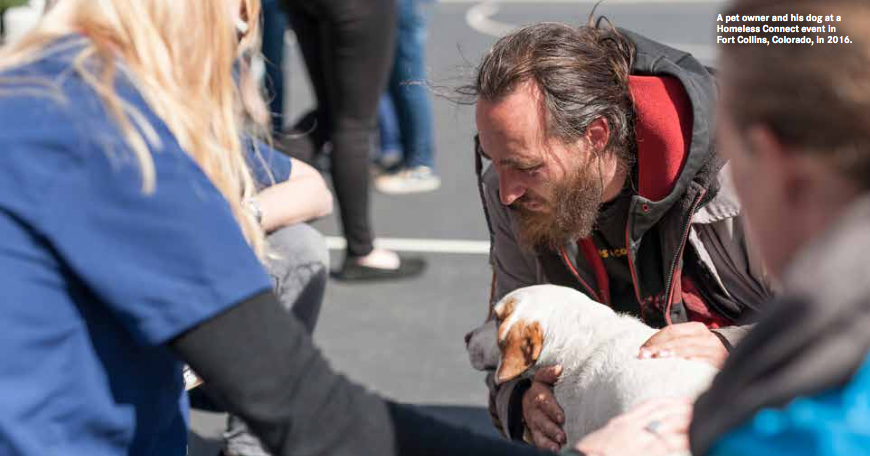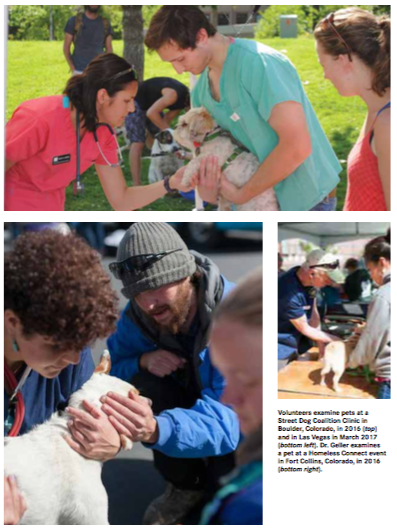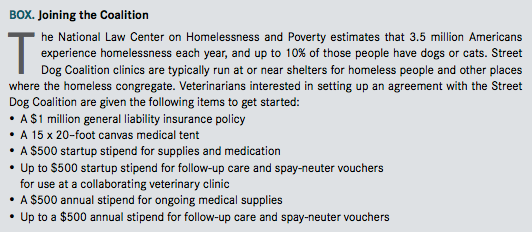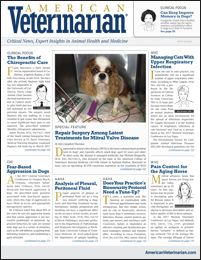Helping Those Who Cannot Help Themselves
A chance encounter with a homeless man and his dog leads one veterinarian to start a unique charity.

Jon Geller, DVM, attended a veterinary conference in Nashville, Tennessee, a few years ago. Although he was there to gain information to support his high-tech emergency hospital in Fort Collins, Colorado, Dr. Geller gained a good deal more than that.
While taking a walk over a bridge during a break from the conference, Dr. Geller’s eyes met those of a homeless man with a dog. The two connected ever so briefly, and as Dr. Geller continued his walk, he formulated a plan.
“I realized I wanted to help a fairly large subset of people who had no money whatsoever, who are totally left out of our veterinary efforts,” said Dr. Geller. Of course, at his emergency hospital he had clients who loved their pets and wanted to provide treatment but couldn’t afford it. There were programs available to help some of those clients, but the people he had in mind were different. He wanted to help those in the most down-and-out stratum of society, those who typically don’t show up at an emergency facility. Today, Dr. Geller and his Street Dog Coalition provide free veterinary care to homeless people’s pets throughout the country.
Getting Started

Dr. Geller’s desire—to provide veterinary services to homeless and indigent pet owners at no charge—came to him naturally. His mother, who had been involved heavily in animal rescue work, had recently passed away. On the day when his eyes met those of the homeless man, he had been thinking about his mother’s selflessness.
To continue his mother’s legacy, Dr. Geller used the money she left him to start a nonprofit that could really make a difference. “The plan resonated with me and I knew I would embark on this venture to care for these people, where money was totally left out of the equation,” he said.
Thus, he founded the Street Dog Coalition, an all-volunteer organization whose mission is to provide free medical care and other services to pets of the homeless. In the group’s first Street Dog Coalition Clinic in May 2015 in Fort Collins, a team of 5 veterinarians, 3 veterinary students, 4 veterinary technicians, and others provided free veterinary care for 30 dogs and cats. The care provided included vaccinations, heartworm testing and prevention, treatment of minor wounds and infections, pain management, and other services.
Dr. Geller found similarities between his day job and his nonprofit work.
“Working with limited resources was a challenge to medical skills as well,” he said. “What you can learn from history and exam and how much you can do in a field situation uses skills that are complementary to emergency practice.”
Expanding Efforts
Dr. Geller’s plan expanded to help others set up similar clinics. Today, the Street Dog Coalition has satellite operations in Wilkes-Barre, Pennsylvania; Boston, Massachusetts; and Tampa Bay/Sarasota, Florida. There are many advantages to teaming up with Dr. Geller and Street Dog (BOX).
This past spring, Dr. Geller arranged a Street Dog Coalition Clinic in Las Vegas associated with the Western Veterinary Conference (WVC). Both veterinarian and technician attendees volunteered their time.
These events don’t always go as planned. According to Dr. Geller, at the time of the clinic, there had been serial killings of homeless men sleeping on Las Vegas streets, so police and city officials showed up at the event. Homeless advocates later confirmed that the presence of authorities deterred many of the homeless pet owners in the area, because they feared legal retribution, deportation, or loss of their pet.
In addition, occasionally a pet shows up at these street clinics in urgent need of services that can only be provided at a veterinary hospital. Sometimes referrals can be negotiated, but usually euthanasia rather than treatment is the outcome because of the costs involved and the challenges of follow-up care.
I met Dr. Geller at the WVC clinic. A man of action, he plans to have Street Dog Coalition Clinics associated with many other conferences soon. If you have an opportunity to participate, jump at the chance. It was an over-the-top rewarding experience for me. The look on the face of a downtrodden person when you help his or her pet is priceless. My heart felt full on the bus ride back to the conference.

When I spoke with Dr. Geller recently, he encouraged me to get started in my own hometown. “Find a homeless day center or shelter and take 3 appointments once a week. That’s what I did,” he said.
Dr. Geller said, “There are really 3 components to my work with the homeless. First, I’m giving up 1 to 2 hours a week at the day shelter in my local community. It is not expensive for me to do that—any veterinarian could. Just think of how many practicing veterinarians there are in the United States. If each gave up just a few hours a month, there would be enough service hours to take care of a large number of pets for those without the financial resources to pay for veterinary care. Second is the Street Dog Coalition Clinics we do regionally, like those in Boston or Pennsylvania, a few times a year. Third is the convention work like WVC or other national events, like the work we’ll be doing with veterans in November in Washington, DC.”
Coming Full Circle
This fall, Dr. Geller will be teaming up with local veterinarians leading a Street Dog Coalition Clinic at the International Veterinary Emergency and Critical Care Symposium in Nashville. Who knows? Maybe he’ll get to see the homeless man who caught his eye a few years ago. Only this time Dr. Geller will be prepared to help that man’s dog with some basic medical care.
Dr. Coles, a certified compassion fatigue professional (CCFP) and Missouri recovery support specialist-peer (MRSS-P), is a well-being adviser, medical writer, veterinary practitioner, and founder of Compassion Fatigue Coach in Overland Park, Kansas.
